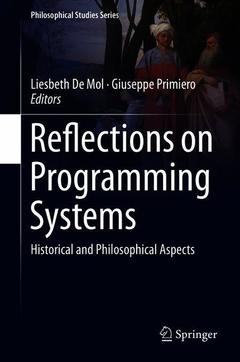Description
Reflections on Programming Systems, 1st ed. 2018
Historical and Philosophical Aspects
Philosophical Studies Series, Vol. 133
Coordinators: De Mol Liesbeth, Primiero Giuseppe
Language: English
Subjects for Reflections on Programming Systems:
Keywords
Operating Systems; Evolution of Software and Hardware; Business Computing; Ethical Software; History of Programming Languages; Coding practices; OS historical analysis; OS Philosophical Analysis; History graphical user interfaces; Ontology GUI; Unix system history; AISB/IACAP Conference Proceedings; IFIP Advances in Information and Communication Technology; THE operating system; Data Validation history; ALGOL 60
286 p. · 15.5x23.5 cm · Hardback
Description
/li>Contents
/li>Biography
/li>Comment
/li>
This book presents a historical and philosophical analysis of programming systems, intended as large computational systems like, for instance, operating systems, programmed to control processes. The introduction to the volume emphasizes the contemporary need of providing a foundational analysis of such systems, rooted in a broader historical and philosophical discussion.
The different chapters are grouped around three major themes. The first concerns the early history of large systems developed against the background of issues related to the growing semantic gap between hardware and code. The second revisits the fundamental issue of complexity of large systems, dealt with by the use of formal methods and the development of `grand designs? like Unix. Finally, a third part considers several issues related to programming systems in the real world, including chapters on aesthetical, ethical and political issues.
This book will interest researchers from a diversityof backgrounds. It will appeal to historians, philosophers, as well as logicians and computer scientists who want to engage with topics relevant to the history and philosophy of programming and more specifically the role of programming systems in the foundations of computing.
Preface.- Part I: Programming without Systems.- Chapter 1. Validity & Correctness before the OS: the case of LEO I and LEO II (Rabia Arif, Elisabetta Mori, Giuseppe Primiero).- Chapter 2. What is an Operating System? A historical investigation (1954–1964) (Maarten Bullynck).- Part II: Formalizing Systems.- Chapter 3. Formal Semantics of ALGOL 60: Four Descriptions in their Historical Context (Troy K. Astarte, Cliff B. Jones).- Chapter 4. Sans-papiers as first-class citizens (Julian Rohrhuber).- Part III: Creating Systems.- Chapter 5. Unix, Plan 9 and the Lurking Smalltalk (Stephen Kell).- Chapter 6. Unix: Building a Development Environment from Scratch (Warren Toomey).- Part IV: Evaluating Systems.- Chapter 7. Ethical Operating Systems (Naveen Sundar Govindarajulu, Selmer Bringsjord, Atriya Sen, Jean-Claude Paquin, Kevin O’Neill).- Chapter 8. From Sovereign Operating Systems to the Sovereign Digital Chain (Gael Duval).- Chapter 9. Elegance in Software (Robin K. Hill).
Dr. Giuseppe Primiero is Associate Professor of Logic at the Department of Philosophy, University of Milan (Italy). He is President of the DHST-DLMPST Commission on the History and Philosophy of Computing, Member at Large of the Leadership Committee of the International Association for Computing and Philosophy and since 2016 Secretary General for the Association Computability in Europe. His research areas include logic, philosophy of information and computation.
Liesbeth De Mol is a CNRS researcher based in France. She is the founding president of the DHST/DLMPST Commission for the History and Philosophy of Computing, coundil and steering committee member of the Association for Computability in Europe and principal investigator of the ANR research project PROGRAMme on the history and philosophy of computer programs (2018-2022). Her research focuses on the histoircal and epistemological connections between logic, programming and computing.



